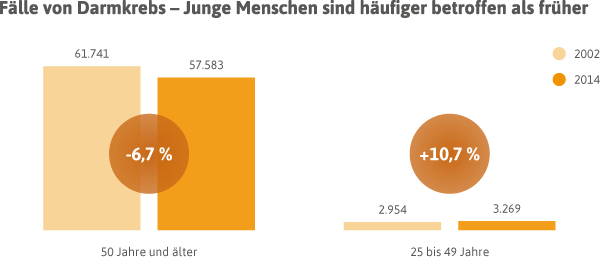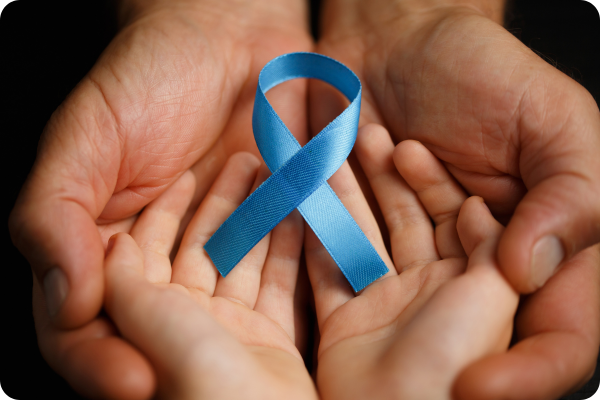Who Should Get Screened for Colon Cancer? Key Risk Factor
Colon cancer, also known as bowel cancer, is the third most common cancer worldwide and accounts for 10% of all cancer cases. It predominantly affects people ages 50 and above [1], people with a chronic condition such as inflammatory bowel disease as well as people with a family history [3].Younger people are also increasingly affected though [2].
The good news is: Even though colon cancer is the second leading cause of cancer-related deaths [1], it's also one of the most treatable ones if detected at an early stage. That’s why the Ministry of Health in Germany and health insurance providers recommend performing a FIT stool test once a year starting at age 50 [3].
Spot Colon Cancer Early and Beat it Fully
Colon cancer is one of the most common cancer types and is almost always treatable through a simple colonoscopy – if detected early [4]. Detecting precancerous lesions or tumors early is crucial in preventing a late-stage diagnosis. For instance, around 90% of people diagnosed at stage I survive the colon cancer diagnosis at least five years after or more, compared to only around 10% at stage IV [5].
The most well-established screening options are a colonoscopy or rapid tests known as fecal immunochemical tests (FIT Tests). A FIT Test can be carried out at home. While a colonoscopy provides a direct examination of the intestinal mucosa, a FIT test offers a non-invasive alternative. But how does colon cancer develop and when do colonoscopy and FIT stool tests for early screening come into play?
Colon Cancer Develops Over Time
Colon cancer, medically known as colorectal carcinoma, occurs in the large intestine or rectum due to uncontrolled cell growth, forming tumors that affect healthy tissue. About 90% of colon cancer cases develop slowly over an average of ten years from benign intestinal polyps. These can be detected early and, in most cases, simply removed during a colonoscopy.
The process begins when the genetic material in a single cell of the intestinal mucosa mutates and starts to divide, forming a benign polyp. As these polyp cells continue to divide, the polyp grows larger. The good news: even a large polyp can be easily removed through a colonoscopy. However, when genetic mutation of the polyp cell occurs, the cells turn cancerous and begin to grow aggressively in the intestine [6].
Rising Colon Cancer Cases in Young Adults
Colon cancer is increasingly affecting younger individuals. While in Germany, diagnoses among those over 50 declined between 2002 and 2014, they rose in the 25 to 49 age group (Köhn S., 2019). Moreover, the American Cancer Society reported that 20% of colon cancer cases in 2019 were patients under the age of 55 [2].
Younger patients are often diagnosed at later stages, which can have serious consequences. Those with a family history of colon cancer or chronic inflammatory bowel diseases are at a higher risk, making an early colonoscopy a justifiable preventive measure [3].

FIT tests are a simple, non-invasive alternative that allow for self-testing at home in under 20 minutes. In oder to detect signs of polyps or tumor development early, it is recommended to carry out a FIT Test for an annual colon cancer screening regardless of age.
Symptoms of Colon Cancer: For Men & Women Alike
Many people do not have symptoms of colon cancer in an early stage, nor are symptoms specifically gender related or tied to the tumor’s location in the colon [8]. The following symptoms appear both in men and women, and call for preventive action:
1. Changes in bowel habits: persistent diarrhea, constipation, or alternating between the two.
2. Cramping abdominal pain and frequent, urgent bowel movements, often without stool passage.
3. Pale complexion and anemia: a potential sign of hidden gastrointestinal bleeding (occult bleeding).
4. Unexplained weight loss and persistent fatigue.
5. Visible blood in stool or dark, tar-like stool.
6. Increased mucus in stool.
These symptoms may also be caused by benign conditions such as hemorrhoids or intestinal inflammation. However, the earlier colon cancer is detected, the better are the chances of successful treatment [9].
Colon Cancer Screening Options
Colonoscopy Explained: What to Expect During Procedure
A colonoscopy is a visual examination of the intestinal mucosa, in which irregularities such as polyps or small tumors can be detected directly. It involves inserting a flexible tube with a light and camera – called a colonoscope – through the rectum and colon up to the small bowel.
Since a colonoscopy allows for a direct visualization of the bowel, polyps can often be removed immediately and analyzed in a laboratory. However, the procedure of a colonoscopy requires thorough bowel preparation, including dietary restrictions and the intake of special detoxifying solutions.
Screening at Home: How to Detect Colon Cancer without Colonoscopy
Colon cancer can be detected early through rapid, at home testing collecting a tiny amount of stool sample and applying it onto a rapid test cassette. As a less invasive method of colon cancer screening, the fecal immunochemical test (FIT Test), detects occult blood (hemoglobin) in stool samples through specific antibodies and serves as an early detection screening tool.
But how is occult blood in stool related too colon cancer? Occult blood are tiny amounts of blood in stool that are not visible to the naked eye. If the concentration of occult blood in stool exceeds a certain threshold, it indicates that in the gastrointestinal tract there is bleeding, which could stem from polyps. These are the precursors to colon cancer, or early-stage tumors and often go unnoticed without symptoms.
The Smartphone-Based FIT Test for Colon Cancer Screening is Highly Reliable
FIT Tests are rapid tests that can be completed in under 20 minutes at home and detect abnormalities in the bowel. The advantage of FIT testing lies in its ease of use and high aplicability. FIT-Tests requires no preparatory measures such as dietary restrictions. Moreover, a recent study by the German Cancer Research Institute (DKFZ) compared the performance of the smartphone-based stool test Preventis SmarTest® FIT Home, with that of a laboratory-based FIT test. The study found that the diagnostic performance of this self-test is comparable to that of laboratory FIT testing [11]. Like a laboratory FIT test, Preventis SmarTest® FIT Home allows for the quantitative detection of hemoglobin in stool with a numerical value, making it a valuable screening tool and complementary test to colonoscopies. Colonoscopies are typically performed every five to ten years. Regular FIT testing at home is recommended once a year and increases the sensitivity of colon cancer screening [10].
How to Test For Colon Cancer in under 20 Minutes

Discover Preventis SmarTest® FIT Home
FIT Test or Colonoscopy? Choose the Right Screening for You
Colon cancer is almost always curable if detected early, and screening can be done easily. The key is regular preventive measures such as colonoscopy or at-home FIT testing. A stool test provides an initial assessment and should ideally be used in addition to colonoscopy. Unlike colonoscopy, FIT testing is a non-invasive method that requires no preparation. Because no instruments are inserted into the body, there is no risk of tissue injury.
Take the first step and screen yourself for colon cancer with a rapid test for home use like Preventis SmarTest® FIT Home or PreventID® CC. The sooner you act, the better.
